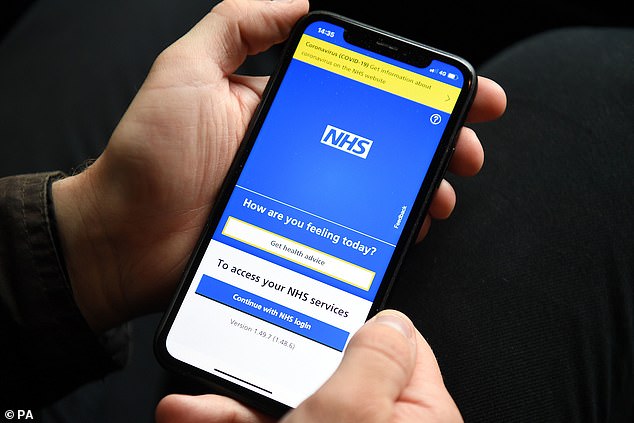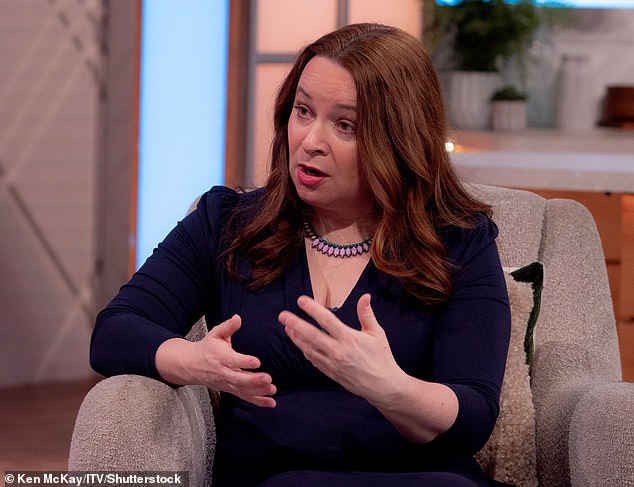Alarm over ‘terrible Big Brother-like’ plan for NHS app to track your steps to improve nation’s health
Doctors will soon use the NHS app to track patients’ steps under government plans to tackle obesity and get tens of thousands back to work.
The move, part of a broader plan to completely revamp the app, would make “us feel healthier as a nation,” Health Minister Victoria Atkins claimed.
But the ‘nanny state’ measure has already caused alarm among critics, who warned it would backfire. One doctor even described it as ‘terribly Big Brother-like’.
Funded by the £3.4 billion investment in new technology announced in Chancellor Jeremy Hunt’s Budget, the NHS will tap into the ‘wealth of data’ collected by smartphones.
Ms Atkins said it would allow the health service to link step count and heart rate data, which are routinely stored on smartphones, so doctors can provide personalized advice, screening and treatment.
The move, part of a wider plan to completely revamp the app, would make ‘us feel healthier as a nation’, claimed Health Minister Victoria Atkins (pictured)

Funded by the £3.4 billion investment in new technology announced in Chancellor Jeremy Hunt’s Budget, the NHS will tap into the ‘wealth of data’ collected by smartphones. Ms Atkins said it would allow the health service to link step count and heart rate data, which are routinely stored on smartphones, so doctors can provide personalized advice, screening and treatment.
Responding to the measure on X, formerly known as Twitter, NHS doctor and author Dr Rachel Clarke said: ‘Horrible Big Brother-esque undertones to this headline.
‘I will not electronically monitor any of my patients without their consent, nor do I act as an outpost of the Department for Work and Pensions.’
The doctor, who recently co-wrote ITV Covid hospital drama ‘Breathtaking’, added: ‘Our patients are people, not economic productivity widgets.’
Meanwhile, Dennis Reed told MailOnline: ‘This is the nanny state in the extreme. People will wake up and discover that apps control their lives, literally every step of the way.
‘Fortunately, most older people are very suspicious of apps and if this proposal becomes a reality, many will uninstall the app because of the civil liberties implications.
‘The Secretary of State’s thoughtless approach to new technology will backfire unless she gets to grips with her enthusiasm for all things digital.’
About £430 million of the £3.4 billion investment will be put into the NHS App, Ms Atkins said.
She said The times the reforms played a “very important role” in reducing the record 2.8 million people currently absent due to long-term illness.
“A strong economy helps pay for the NHS, but actually a strong NHS helps a growing economy,” she said.
Ms Atkins added: “If you think about the data we have on our phones, the health service will absolutely be there to encourage people to find out what a healthy lifestyle is for them.
‘How can they help people stop smoking, talking about therapies through the NHS app… these are all things that will help us in the future.’
The wider £3.4 billion investment will also see the introduction of AI assistants to help write doctors’ notes and interpret scans for diseases such as cancer more quickly.
But the AI assistant note plan itself has also faced a backlash, with patient safety campaigners warning that people may feel too embarrassed to discuss medical issues freely while being recorded.
Others fear the notes may be inaccurate.
On Wednesday, Chancellor Jeremy Hunt claimed that NHS staff would stop wasting time filling out forms and instead increase the number of appointments to tackle the NHS backlog.
Around £1 billion will also be used to introduce an NHS workforce app, making it easier for staff to move employment data through the system.
Earlier this week, the Office for Budget Responsibility warned that the number of unemployed would remain high for years to come, as economic inactivity appears to be ‘more persistent’ than previously thought.

Responding to the measure on ‘I will not electronically monitor any of my patients without their consent, nor do I act as an outpost of the Department for Work and Pensions.’ The doctor, who recently co-wrote ITV Covid hospital drama ‘Breathtaking’, added: ‘Our patients are people, not economic productivity widgets’
Others have also long predicted that benefits could rise by £9 billion between 2019 and 2027.
MailOnline understands that there are around 3,000 people claiming Personal Independence Benefits – benefits available to people with a long-term condition or disability – with the main condition being ‘obesity’.
It comes as Ms Atkins told a Nuffield Trust summit yesterday that the NHS needed a “turnaround” like Marks and Spencer to ensure its productivity plan “improves care across England”.
Announcing the appointment of former M&S chief executive Steve Rowe as NHS productivity tsar, she said: ‘We are on the cusp of a medical revolution, where technology, personalized therapies and better data could transform outcomes for a generation who is more health conscious. than any who came before them.
‘The NHS must seize this opportunity and look to the future, not limit ourselves to what has always been done. In fact – to coin a phrase – it has to be an M&S moment.
‘This much-loved British brand, which has been a mainstay on our high streets for decades, recognized the need for change and embraced modernity, pivoting to the next generation to take over and securing its long-term future.
‘This is what the NHS needs to do to ensure it survives for the next 75 years.’
